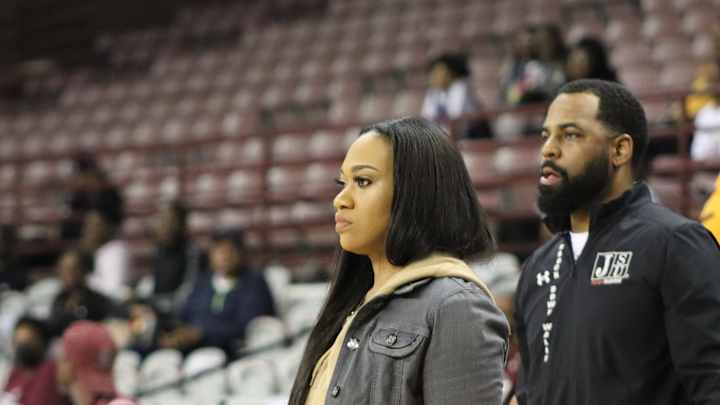Tomekia Reed, Eddie George Set The Record Straight On HBCU Coaching

From Pop Warner to Little League, and from junior high and high school, coaches had a significant role in developing boys and girls in the black community. In most cases, the coach was the first to give structure and consistent discipline to the point where they were revered on the level of a grandparent, preacher, or school teacher.
If you crossed the line, parents or teachers would threaten, "don't let me call your coach!" They would help to restore order at home or in the classroom. An HBCU coach was at the pinnacle of respect in the black culture. Today, there's a subtle shift.
However, several prominent coaches have maintained their integrity and respect for the role amid the complaints and viral videos of negativity.
HBCU coaches Tomekia Reed and Eddie George weighed in on the latest round of negativity surrounding coaching at HBCUs following Ed Reed's viral videos and Deion Sanders' subsequent interviews after leaving Jackson State.
"Coaching at an HBCU is not for the weak," Tomekia Reed wrote. "You're going to fight battles internally and externally. And if your program experiences any type of success, it will be even harder. I chose to come back for the fight. To truly even the playing field and do something that's never been done."
The tone and level of disrespect celebrity head coaches exhibit for HBCUs is troubling. Traditions and precedents in poorly administered environments must change, and most of the commentary has merit. Still, the tone and manner displayed a dishonor for HBCUs across America.
Reed continued her thoughts: "You have to earn stripes to speak publicly about this struggle. If you aren't willing to roll up your sleeves, make a difference and demand others to respect us, not by words but by actions, then get out of the way. We got something to do! Our work here is bigger than us."
Hiring high-profile coaches is a practice that has been around for HBCUs. Today's challenge for athletic directors and administrators is to placate coaches and stay out of their scrutiny via social media and other channels. A few seem entitled, but not all.
Over recent years, the latest crop of HBCU coaching hires of previous NFL and NBA professionals were: Deion Sanders, Eddie George, Hue Jackson, Reggie Theus, Mo Williams, and Ed Reed. They had one common trait; they lacked HBCU pedigree like Trei Oliver, Eric Dooley, or Eddie Robinson Jr.
Most came for PWIs and did not understand the years of systemic barriers HBCUs have been a part of in our society.
Coach Eddie George responded to Ed Reed's rant while on the Rise & Grind Podcast. "And you know, it's frustrating. You know, he didn't understand exactly what he was getting himself into" coaching an HBCU.
Deion Sanders and Ed Reed have voiced their disdain for the working conditions, and in Sanders' case, he sought to make situations better for his players and staff. Unless you are willing to get your hands dirty, work, and develop our young student-athletes, keep the complaints and criticisms to yourselves. Better yet, keep it within the family.
STEM NOLA founder and author Dr. Calvin Mackie (Morehouse alum) shared his thoughts with me, "These caricatures have been coddled, groomed, placated and exploited by PWIs since they have shown physical prowess, and now want to present themselves as experts on HBCUs and Black people."
It's a complex topic. The HBCU story has endured for over a century and will continue to make strides today and after the recent diatribes from disgruntled former stars.
What's next for the coaches whose former experience and backgrounds could promise a wealth of wisdom for HBCU sports programs?
We shall see.

I am Kyle T. Mosley, the Founder, Managing Editor, and Chief Reporter for the HBCU Legends. Former founder and publisher of the Saints News Network, and Pelicans Scoop on SI since October 2019. Morehouse Alum, McDonogh #35 Roneagles (NOLA), Drum Major of the Tenacious Four. My Father, Mother, Grandmother, Aunts and Uncles were HBCU graduates! Host of "Blow the Whistle" HBCU Legends, "The Quad" with Coach Steward, and "Bayou Blitz" Podcasts. Radio/Media Appearances: WWL AM/FM Radio in New Orleans (Mike Detillier/Bobby Hebert), KCOH AM 1230 in Houston (Ralph Cooper), WBOK AM in New Orleans (Reggie Flood/Ro Brown), and 103.7FM "The Game" (Jordy Hultberg/Clint Domingue), College Kickoff Unlimited (Emory Hunt), Jeff Lightsly Show, and Offscript TV on YouTube. Television Appearance: Fox26 in Houston on The Isiah Carey Factor, College Kickoff Unlimited (Emory Hunt). My Notable Interviews: Byron Allen (Media Mogul), Deion Sanders (Collegiate Head Coach), Drew Brees (Former NFL QB), Mark Ingram (NFL RB), Terron Armstead (NFL OL), Jameis Winston (NFL QB), Cam Newton (NFL QB), Cam Jordan (NFL), Demario Davis (NFL), Allan Houston (NBA All-Star), Deuce McAllister (Former NFL RB), Chennis Berry (Collegiate Head Coach), Johnny Jones (Collegiate Head Coach), Tomekia Reed (Women's Basketball Coach), Tremaine Jackson (Collegiate Head Coach), Taylor Rooks (NBA Reporter), Swin Cash (Former VP of Basketball - New Orleans Pelicans), Demario and Tamala Davis (NFL Player), Jerry Rice (Hall of Famer), Doug Williams (HBCU & NFL Legend), Emmitt Smith (Hall of Famer), James "Shack" Harris (HBCU & NFL Legend), Cris Carter (Hall of Famer), Solomon Wilcots (SiriusXM NFL Host), Steve Wyche (NFL Network), Jim Trotter (NFL Network), Travis Williams (Founder of HBCU All-Stars, LLC), Malcolm Jenkins (NFL Player), Willie Roaf (NFL Hall of Fame), Jim Everett (Former NFL Player), Quinn Early (Former NFL Player), Dr. Reef (NFL Players' Trainer Specialist), Nataria Holloway (VP of the NFL). I am building a new team of journalists, podcasters, videographers, and interns. For media requests, interviews, or interest in joining HBCU Legends, please contact me at kmosley@hbcusi.com. Follow me:
Follow ktmoze